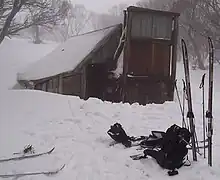Nelse, Victoria
Nelse is a small rural locality in the Bogong High Plains of Victoria, Australia. Nelse is renowned for its Mount Nelse, Edmonsons, and Johnsons Huts Walk.[2] The 18.7-kilometer Mount Nelse and Huts Walk[3] is popular among backpackers, birding enthusiasts, and campers, offering diverse terrain and captivating landscapes. It takes approximately 5 hours and 3 minutes to complete,[3] with opportunities for "solitude" during quieter times of the day. The trail is best explored between November and May when the weather is favorable.[3] Dogs are also not allowed on the trail to protect its delicate ecosystem;[3] as Nelse is part of the Alpine National Park, with its "Zone Code" primarily being a Public Conservation and Resource Zone (PCRZ). [4] [5]
| Nelse Victoria | |||||||||
|---|---|---|---|---|---|---|---|---|---|
 Nelse | |||||||||
| Coordinates | 36°49′57″S 147°21′37.08″E | ||||||||
| Population | 6 (2016 census)[1] | ||||||||
| • Density | 0.0269/km2 (0.070/sq mi) | ||||||||
| Postcode(s) | 3699 | ||||||||
| Elevation | 1,893 m (6,211 ft) | ||||||||
| Area | 223.097 km2 (86.1 sq mi) | ||||||||
| Location |
| ||||||||
| LGA(s) | Shire of East Gippsland | ||||||||
| State electorate(s) | Benambra | ||||||||
| Federal division(s) | Indi | ||||||||
| |||||||||
History
Nelse was originally a cattlemen station and is home to a significant historical site – Wallace's Hut. This notable structure, dating back to 1889, is among the oldest surviving huts in the region. It was built in just six weeks by Irish brothers Arthur, William, and Stewart Wallace. Sitting amidst ancient snow gums on a grassy plateau above the snowline, this hut has both historical and architectural significance to the State of Victoria and has been listed on the Victorian Heritage Register (VHR) as a result. [6]

Wallace's Hut is historically important in the context of Nelse and the surrounding Alpine National Park. It was originally built to provide shelter for cattle herders working in the remote and rugged Bogong High Plains. During the 1914-18 drought, the hut had served as a crucial refuge for stockmen from New South Wales and their sheep. While numerous huts were erected in the region throughout that era, they typically had frail structures and were highly susceptible to the weather and bushfires. As a result, no other huts from the nineteenth century have endured as Wallace's Hut has. [6]
Beyond its historical value, the hut also played a role in the early days of hydroelectric power in the State of Victoria. From the late 1920s to the early 1940s, the State Electricity Commission of Victoria (SEC) used it to collect weather data on precipitation, which contributed to the development of hydroelectricity in the state. [6]
Architecturally, Wallace's Hut is a unique example of nineteenth-century construction in Victoria, offering insights into the building methods of the era. While it has evolved over the years due to its use by walkers and skiers, it remains a symbol of the historical and architectural heritage of the Nelse area. [6]
References
- "2016 QuickStats Mount Beauty". Australia’s Guide. Retrieved 24 August 2020.
- https://www.parks.vic.gov.au/places-to-see/sites/mt-nelse,-edmonsons-and-johnsons-huts-walk. Parks Victoria. Retrieved 27 June 2023.
- https://www.alltrails.com/trail/australia/victoria/mount-nelse-and-huts-walk. Alltrails. Retrieved 27 June 2023.
- https://planning-schemes.app.planning.vic.gov.au/EAST%20GIPPSLAND/ordinance/8702936. Victoria State Government Department of Transport and Planning. Retrieved 27 June 2023.
- https://mapshare.vic.gov.au/vicplan/. Vic Plan. Victoria State Government Department of Transport and Planning. Retrieved 27 June 2023.
- https://vhd.heritagecouncil.vic.gov.au/places/153. Hertiage Council Victoria. Retrieved 17 October, 2023.